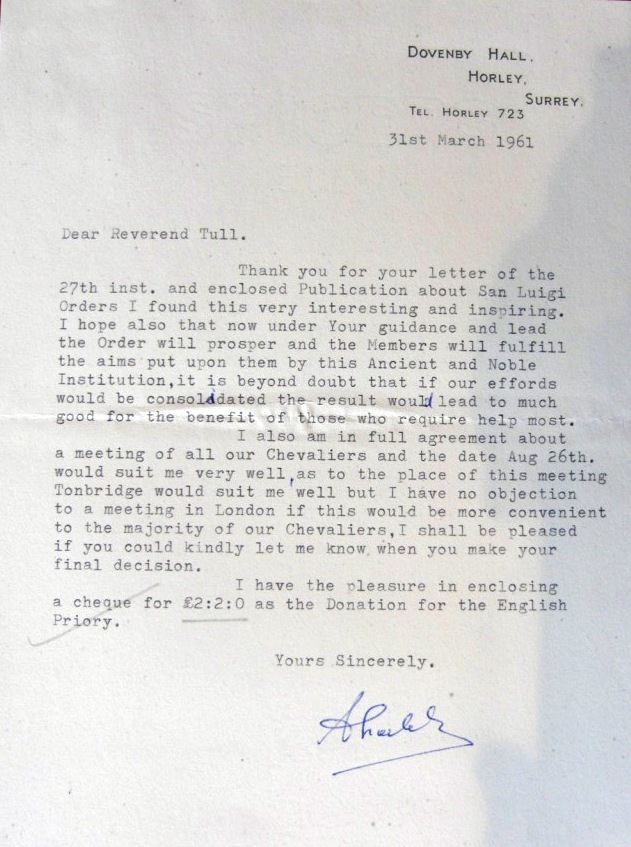 Count Andrzej (Andrew) Skarbek (1925-2011) was the son of Count Stanislaw Skarbek (see previous article) and like his father was a member of the Order of the Crown of Thorns.
Count Andrzej (Andrew) Skarbek (1925-2011) was the son of Count Stanislaw Skarbek (see previous article) and like his father was a member of the Order of the Crown of Thorns.
His obituary in The Daily Telegraph summarized his life by saying that he “made a hair-raising escape from occupied Poland under the eyes of both the Soviets and the Nazis; after the war he settled in Britain, where he became one of a group of pioneers who helped to develop psychotherapy services in the NHS.” But there was much more to him than this.
“Andrzej Karol Skarbek was born on January 10 1925 on the family estate of Drohowyze in Lwow (now Lviv in Ukraine), the younger son of Stanislaw Skarbek, a cavalry officer in the Polish Lancers and the last curator of a family charitable foundation dedicated to the care of orphans and the poor.
The Skarbeks were an ancient family who traced their history back to 1109 ; in 1410 one ancestor helped to drive the Teutonic Knights from Poland. The family obtained the hereditary title of Count in Galicia in 1778, and in Austria and Russia in 1835. Andrzej’s mother, Zosia, née Czecsz de Lindenwald, came from a prominent family in the Austro-Hungarian empire.
The Skarbeks owned estates in Lwow, Kraków and, most famously, at Zelazawa Wola, near Warsaw, where the composer Chopin was born. Chopin’s father, Nicholas Chopin, was tutor to the Skarbeks and married a distant relative of the family. Their musical son, Frédéric, was named after the then Count Skarbek, who became the boy’s godfather.
Andrzej Skarbek and his elder brother Jas were brought up in Lwow and, like many aristocratic families of the time, were taught in French and Polish mainly by tutors and governesses. When, following the signing of the Molotov-Ribbentrop Pact, the Germans invaded eastern Poland and took Lwow in September 1939, the Skarbeks were able to continue a relatively normal life, but the Germans soon withdrew and the Russians occupied the city. That October, informed by a family retainer that they were on a Communist “hit list”, the family fled westwards to stay with relatives, moving to family estates in Tarnagora and then Milocin, near Lublin. There Andrzej, through a cousin, became involved in the Polish Resistance. Using the limited medical experience he had acquired working in the family charitable foundation in Lwow, he was reputed to have bluffed his way into the concentration camp at Majdanek and rescued 24 wounded Polish hostages.
In 1944, with the Russians closing in, the Skarbeks had to flee again, this time in a sealed compartment in a Hungarian troop train to the temporary safety of Budapest.
There they stayed with a protégé of the Regent of Hungary, and Andrzej was able to charm his way into attending medical lectures at the university. When the Red Army arrived in Hungary, the Skarbeks were smuggled across Russian lines by a Jewish family and found refuge with relatives in the Clam-Gallas Palace in Vienna. When the Russians eventually entered that city, they only just escaped in the back of a British jeep.
In 1945 Andrzej Skarbek joined General Anders in the Polish II Corps in Ancona, Italy. At the end of the war, aged 21, he arrived by troop train in London, where his father had been appointed Minister of Defence in the Polish government-in-exile in Eaton Square. Andrzej learned English and gained entry to St Mary’s Hospital, Paddington, where he qualified as a doctor in 1954.
During his studies, in 1952, he undertook the harrowing task of identifying the body of his cousin, Krystyna Skarbek, who had been stabbed to death at a Kensington hotel where she worked.
During the war Krystyna (operating under the nom de guerre Christine Granville) had worked behind enemy lines for SOE, helping Polish soldiers and airmen escape Poland; after D-Day, under the alias Pauline Armand, she joined Francis Cammaerts, SOE’s “Roger”, in charge of the SOE circuits in south-eastern France, becoming involved in the Battle of Vercours and surviving several brushes with the Gestapo. She had become known as Churchill’s favourite spy and it is thought that Ian Fleming based the Bond girls Vesper Lynd in Casino Royale and Tatiana Romanova in From Russia With Love at least partly on her.
Andrzej’s first jobs, which were in paediatrics at the children’s unit at Paddington Green, brought him into contact with the psychoanalyst Donald Winnicott, whose influence was instrumental in Skarbek’s decision to specialise in psychiatry. In 1965, while carrying out research for a PhD in this field, Skarbek travelled to Poland — his first visit since the war — to see relatives and family estates. He was deeply affected when former retainers warmly welcomed the return of their young “master” .
In the 1960s Andrew Skarbek, as he was known, became involved with the Langham Clinic as a colleague of R.D. Laing. He became, in 1969, clinical director of the London Clinic of Psychotherapy, which he ran from his home in Belsize Square, also building up a successful private practice, which continued until a few years ago.
Following appointments at University College Hospital and at the King George Hospital, Ilford, Skarbek’s NHS career culminated in his appointment, in 1977, as consultant psychotherapist at Runwell, Rochford and Basildon Hospitals, where he remained until retirement. Here he developed a psychodynamic psychotherapy service (psychodynamic psychotherapy aims to reveal the unconscious content of the patient’s psyche in order to alleviate mental stress) .
An incurably romantic and charismatic figure, Count Skarbek was proud of his aristocratic Polish heritage and found it difficult to overcome the scars left by his wartime experiences. Yet he lived life with an escapist intensity and could often be seen at family parties, glass of vodka in hand, laughing and dancing to Polish tangos or Hungarian czardas, or singing along to the waltz from Lehar’s Merry Widow.
In 1952 he married Shelagh de Fane Edge Morgan, with whom he had four children. The marriage was later dissolved, and in 1974 he married the investigative writer Marjorie Wallace who, stimulated by his knowledge of psychiatry, later founded the mental health charity SANE. They had three sons and although they later separated they remained close.”
The following letter from our archives shows Count Skarbek’s generosity and support for the San Luigi Orders.



You must be logged in to post a comment.